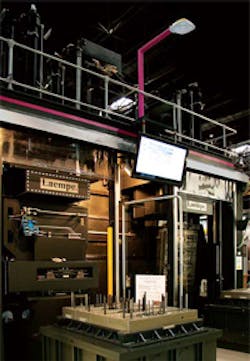3D Monitoring Assures Safe Operation for Automated Foundry Equipment
SafetyEye, a camera system for three-dimensional safety monitoring is described as “revolutionary” by its developer, Pilz Automation Safety L.P. (www.pilz.us), which has now released it for North American industrial buyers. It has been operating since last year at four Daimler AG plants in Europe, protecting transfer lines and other operations for the automaker.
Pilz GmbH & Co. KG, the parent to Pilz Automation Safety, developed the SafetyEye system in collaboration with Daimler. Last June at GIFA 2007 in Dsseldorf, Germany, Pilz demonstrated the SafetyEye in action, providing protection for the L-Twin coreshooter machine —which at the time was being introduced by Laempe & Moessner GmbH. (www.laempe.com; a summary of the LTwin development was reported in FM&T July 2007, p. 10. The system is available in North America through Laempe+Reich, www.laempeNA.com.)
In the GIFA demo, the L-Twin created foundry cores by injecting a mixture of sand and binder into a die. It worked continuously with two tools, compared to a standard core-shooting machine that works with one tool. When a standard machine needs to be cleaned there is a two- or three-hour halt in production. Not only does the L-Twin prevent that production interruption, it doubles production with every shift. It does all this while occupying the same volume of floor space as a single machine, by using the tools more efficiently and allowing for the removal of the finished core from one station while another core is being produced in the second station.
The SafetyEye package consists of a 3D camera/ sensor and a controller that is configured via a PC. It is designed to monitor operations in one or more three-dimensional zones around a manufacturing system. With this 3D capability, it can replace a multitude of twodimensional sensors that would be required otherwise. It monitors, controls, and protects, and its detection zones can be configured flexibly and quickly on a PC.
The overhead-mounted camera/sensor unit delivers photo/data of the protected area to the control unit, which creates – with the help of a very complex algorithm – a 3D picture. The PC makes it easy for operators to configure the protected zone or zones. In the case of the L-Twin, several zones were configured on each side of the machine. Zones were established on each side to slow the operation of the machine, and to sound a warning when a person ventures too close to the machine. Closer to the machine, on both sides, zones were set up to stop the operation completely if someone entered the true danger zone.
Laempe & Moessner created warn and protection zones quickly and intuitively with the Pilz configuration tool on a PC. Multiple 3D views guaranteed a precise configuration. The monitoring of the danger zone no longer was based on technical necessities but on the demands of the complex processes of the user.
“Without SafetyEye, they were using multiple laser scanners and light curtains to safe guard it,” states Eric Hollister, application engineer for Pilz. “Not only were there a lot of components, but they got in the way of the operators.”
The configuration tool makes it possible to set up the necessary safety zones quickly and easily. SafetyEye also can automatically adjust the safety zone exactly where it is needed, and when it is needed during operation, making more efficient use of floor space with configurable working zones.
